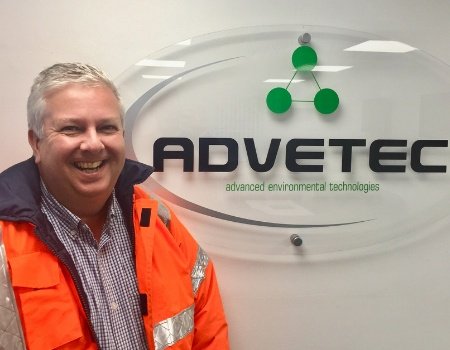“ These bacteria-based solutions have gone well beyond the trial stage and are flexible in terms of application.”
These bacteria-based solutions have gone well beyond the trial stage and are flexible in terms of application.”
Tailored combinations of bacteria, boosted with nutrients, are digesting some of our most challenging organic wastes. Here,Richard Goff, Chief Operating Officer at biotech company Advetec, highlights some examples.
Hidden deep within the term waste management lurks the reality that waste is, all too often, not that easy to manage. One of the key challenges is that, whatever its source and location, it will frequently include a mix of potentially valuable and less valuable materials or streams which are invariably difficult to separate out.
In the past, this might have meant that these mixed wastes, often including organic content, would have been earmarked for landfill. Today, this is far less acceptable or affordable.
Unfortunately, a shift in expectations is not always matched by a behavioural change among consumers. Even when the public is provided with the opportunity to segregate its waste in a leisure setting, the resulting materials tend to be anything but segregated. In an environment such as a busy cross-Channel ferry, food and other organic waste is likely to be mixed in with a huge array of non-organic solids and plastics.
Bacteria-driven process
But even in these unpromising circumstances, bacteria-based digestion systems can provide a massive benefit simply by reducing the organic fraction, while at the same time shrinking the haulage and potentially the disposal costs of the residual waste. These residues can still be mined for valuable materials such as metals, but the digestion approach avoids the need for inefficient, time-consuming and increasingly costly manual sorting at source.
 In other settings, a bacteria-driven process can supplement existing solutions. For example, in an abattoir facility, the traditional Dissolved Air Flotation (DAF) plant for waste matter arguably goes only halfway towards addressing the challenges of this problematic waste stream. Once the water has been separated, what can be done with the filtered-out residue, which contains up to 25% solids?
In other settings, a bacteria-driven process can supplement existing solutions. For example, in an abattoir facility, the traditional Dissolved Air Flotation (DAF) plant for waste matter arguably goes only halfway towards addressing the challenges of this problematic waste stream. Once the water has been separated, what can be done with the filtered-out residue, which contains up to 25% solids?
This filter cake, together with any undigested feed and grass from the bellies of slaughtered animals, can be put through a bacterial process which both reduces water content (thanks to the exothermic reaction) and subjects the organic content to aerobic digestion. An exothermic process releases heat, causing the temperature of the immediate surroundings to rise. This results in a mass reduction of up to 80%, allowing this final residue to be applied as a safe and effective agricultural fertiliser.
Harnessing bacterial activity can help to manage animal waste in other ways. The smell generated by ammonia from excreta-filled litter on large poultry farms can cause an environmental nuisance in the neighbouring area when indoor areas are vented. Spraying this waste with activated bacteria has the effect of neutralising odour and locking in the ammonia, safeguarding its end-of-life value as fertiliser and helping to reduce the risk of disease among the animals.
Tackling congealed grease
Elsewhere, as a company, we have successfully applied exothermic digestion to a hotels mixed room waste. An exothermicprocessreleases heat, causing the temperature of the immediate surroundings to rise. We then utilised activated bacteria on the hotel kitchens fat-trap and saw them literally eat away the blockage of congealed grease. An automated dosing system can be installed to ensure such blockages do not recur.
 Of course, there are other sustainable options available for managing organic waste, notably anaerobic digestion (AD). But AD feedstock needs to be free from inorganic solid contaminants, while plants generally have minimum volume requirements for viability and are relatively costly to install.
Of course, there are other sustainable options available for managing organic waste, notably anaerobic digestion (AD). But AD feedstock needs to be free from inorganic solid contaminants, while plants generally have minimum volume requirements for viability and are relatively costly to install.
Where, on the other hand, there is a clear-cut case for using bacteria-based aerobic digestion, care needs to be taken in identifying precisely which system is appropriate. Different strains of bacteria will be more or less successful in digesting specific waste profiles. With some, activity will be highly dependent on temperature. With others, if there is no nutritional supplement proven to stimulate optimum activity, digestion may be only slow or ineffective.
These bacteria-based solutions have gone well beyond the trial stage and are flexible in terms of application. They are not only providing small-to-medium-sized enterprises with scalable routes to reducing or eliminating hard-to-handle organic waste streams but are helping many of them to reach their target of zero-waste-to-landfill.
In the future, they may help to solve even larger waste problems, such as the growing mountains of ocean plastics and other post-consumer polymers.
Author: Richard Goff is Chief Operating Officer at biotech company Advetec (@advetec).
Guest posts do not necessarily reflect the views of Bio-Based World News’ editorial team and management.
 You may also be interested in…
You may also be interested in…
Read: New online marketplace for organic resources launched in the UK.
Read:Enzyme driven bio-plant to turn problem household waste into resource.
Visit:World Bio Markets, 1st-3rd April 2019, Amsterdam.
NEW!And available to download: Issue #11 of the Bio-Based World Quarterly.





